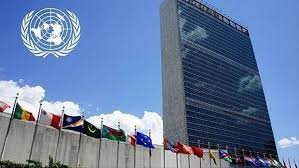Countries considering introducing vaccine mandates in the fight against COVID-19 must ensure they respect human rights, the UN rights chief said on Wednesday, stressing that forced vaccination was never acceptable.

Speaking to a Human Rights Council seminar via video message, Michelle Bachelet warned there were significant rights considerations that needed to be taken into account before making vaccination compulsory.
Any “vaccine mandates must comply with the principles of legality, necessity, proportionality and non-discrimination”, she said, according to a transcript.
“In no circumstances should people be forcibly administered a vaccine.”
The UN High Commissioner for Human Rights said the aims sought by countries mulling mandates to protect lives as Europe and other regions battle fierce surges in the pandemic, were “of course of the highest order of legitimacy and importance”.
But she insisted that “vaccine mandates should be employed only when necessary for achieving compelling public health ends”.
“And they should only be considered when less intrusive measures such as mask-wearing and social distancing have demonstrably failed to meet such health needs.”
She also emphasised that for any mandate to be acceptable, countries needed to ensure that vaccines are truly available and affordable.
“Unless all people have genuine, practical access to vaccines, vaccine requirements will not be consistent with fundamental human rights principles of equality and non-discrimination,” she said.
Read Also: One In 10 Adults Living With Diabetes – Report
Bachelet also highlighted that “the actual vaccines employed must also be sufficiently safe and effective to achieve (the) public health aims.”
Any mandatory vaccination regime also must be flexible enough to allow for “appropriate exceptions, such as where a vaccination is medically contraindicated for an individual.”
Bachelet said it could be appropriate to restrict some rights and liberties, including conditioning access to schools, hospitals or other public spaces on vaccination.
But forced injections was never acceptable, she said, “even if a person’s refusal to comply with a mandatory vaccination policy may entail other legal consequences, including, for example, appropriate fines”.
“Where penalties are imposed, they should be proportionate and subject to review by judicial authorities,” she said.
There needed to be “appropriate procedural safeguards, including the right to seek a justified exemption and the right to appeal any form of penalty before a fair and independent authority,” she insisted.
Looking forward, the UN rights chief said any vaccine mandates introduced “should be subject to frequent official review to ensure they remain necessary, proportionate and non-discriminatory.”
Kindly like us on Facebook















Discussion about this post